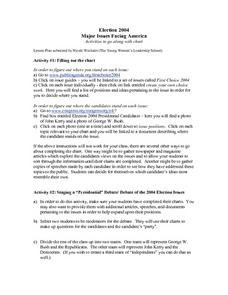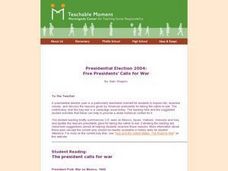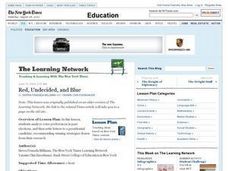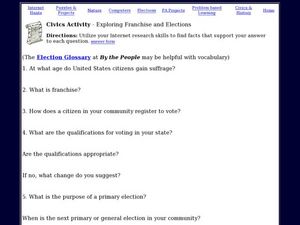Curated OER
Rural Communities Make a Difference
Learners research what analysts say influenced Ohio voters in a Presidential election and discuss what that meant in the election, especially in Ohio. Students use provide Internet sources for research.
Curated OER
Religion and Politics: The Battle Over the Judiciary
Students analyze the relationship between religion an politics. In this Supreme Court lesson, students examine the results of the 2004 presidential election and explore how the results impacted George W. Bush and his Supreme Court...
C-SPAN
Debates
How do the presidential debates of 2016 compare to the debates from the 1980's? What about the 1960's? Evaluate a chosen candidate or issue from the 20th and 21st centuries with a lesson plan focused on political debates. Middle and...
Curated OER
Making Headlines
Students consider their personal opinions about the news and politics, read about the public relations drive behind the 2004 presidential election, and gather information for a press release promoting either Mr. Bush or Mr. Kerry.
Curated OER
Electoral College
Eleventh graders discover how the Electoral College works. In this presidential elections instructional activity, 11th graders compare and contrast the Electoral College and popular vote as they participate in a classroom simulation....
Curated OER
Growing Voters and Election 2004: Classroom Debate
Students research the issues and platforms of candidates and separate propaganda from process in order to choose a candidate to support. Students examine political parties and their contributions to shaping the foundation of the...
Curated OER
US Presidents
Students work in small groups to analyze various presidential campaigns. In this presidential election activity, students research election rules, candidates, and winners from 1900 to 2000. Students will create and present an oral report...
Curated OER
Major Issues Facing America
Students continue to examine the issues of the 2004 presidential election. Using the internet, they discover where they stand on each issue and where each candidate stands on the issues as well. In groups, they participate in a...
Curated OER
Stand and Deliver
Students take a closer look at the presidential election of 2004. For this American politics lesson, students visit selected websites to learn about the 2004 campaign and active citizenship. Students then create...
Curated OER
What's In Store for Four More
Learners examine issues that they consider to be priorities and how President Bush might address them in his next term. They create public service announcement scripts motivating citizens to stay involved in these issues beyond the...
Curated OER
What Now?
Students consider local and national divisiveness over the presidential elections by examining a New York Times editorial and then writing op-eds suggesting how to address post-election discord in their schools and/or communities.
Curated OER
Presidential Election 2004: Five Presidents' Calls for War
High schoolers examine five president's reasons for entering into a war. Using the text, they answer questions and discuss their answers with the class. They also examine President Bush's reasons for going to war in Iraq and how that...
Curated OER
Check the Mates
Students explore John Edwards, the running mate for 2004 Democratic presidential candidate John Kerry. They research the ways in which vice presidential candidates have impacted presidential elections in modern United States history.
Curated OER
It's an Ad Eats Ad World
Students explore the power and influence of television advertisements in presidential campaigns. They choose issues in the 2004 campaign and create promotional materials addressing these issues from varying points of view.
Curated OER
They Have Issues
Students examine the different campaign styles and political platforms of the nine candidates vying for the Democratic Party nomination for the 2004 presidential election. They graph and compare candidate platforms and write an essay...
Curated OER
Red, Undecided, and Blue
Students analyze voter preferences in past elections, and then write letters to a presidential candidate, recommending winning strategies drawn from their research.
Curated OER
Rocking the Vote
Students explore how a presidential candidate can win the popular vote but not receive enough electoral votes to win the election. They analyze various regions' voting trends, explore how these trends reflect the outcome of the 2004...
Curated OER
The Electoral College
Students examine the Electoral College's role in the election process. They conduct Internet research, and identify the elections in which the Electoral College played a deciding role.
Curated OER
Campaign 2004: Classroom Electorate
Students role play as political analysts first forecasting the electoral college vote in a presidential election and then, following the results of the actual count. They study the role of swing states, and why political participation is...
Curated OER
Covering the Campaign Trail: Technological Progress or Temporary Chaos?
Students study the changes in reporting and journalism techniques that have evolved due to advances in technology by reading an online transcript. They debate whether the technological advances are positive or negative in the reporting...
Curated OER
POLITICS AND RELIGION: Targeting Faith When It Counts
Learners research current articles about the influence of religion on the presidential election of 2004.
Curated OER
Exploring Franchise and Elections
Students examine the American election process. In this elections lesson, students use Internet sources to respond to 13 questions about election terminology.
Curated OER
Early Voting, Other Election Changes are Possible
Students use the internet and linked sites to explore current voting methods in their community. They research suggestions that have been made for changes and interview people who made these suggestions (when possible). Students suggest...
Curated OER
The Great Debate
Students watch tapes of televised presidential debates dating from 1960. They analyze debates and participate in mock debates.

























